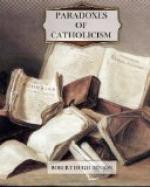(ii) The second charge brought against Catholics is that they make religion far too personal, too private, and too intimate for it to be considered the religion of Jesus Christ. And this is illustrated by the supreme value which the Church places upon what is known as the Contemplative Life.
For if there is one element in Catholicism that the man-in-the-street especially selects for reprobation it is the life of the Enclosed Religious. It is supposed to be selfish, morbid, introspective, unreal; it is set in violent dramatic contrast with the ministerial Life of Jesus Christ. A quantity of familiar eloquence is solemnly poured out upon it as if nothing of the kind had ever been said before: it is said that “a man cannot get away from the world by shutting himself up in a monastery”; that “a man should not think about his own soul so much, but rather of what good he can do in the world in which God has placed him”; that “four whitewashed walls” are not the proper environment for a philanthropic Christian.
And yet, after all, what is the Contemplative Life except precisely that which the world just now recommended? And could religion possibly be made a more intimate, private, and personal matter between the soul and God than the Carthusian or Carmelite makes it?
The fact is, of course, that Catholics are wrong whatever they do—too extreme in everything which they undertake. They are too active and not retired enough in their proselytism; too retired and not active enough in their Contemplation.
II. Now the Life of our Divine Lord exhibits, of course, both the Active and the Contemplative elements that have always distinguished the Life of His Church.
For three years He set Himself to the work of preaching His Revelation and establishing the Church that was to be its organ through all the centuries. He went about, therefore, freely and swiftly, now in town, now in country. He laid down His Divine principles and presented His Divine credentials, at marriage feasts, in market-places, in country roads, in crowded streets, and in private houses. He wrought the works of mercy, spiritual and corporal, that were to be the types of all works of mercy ever afterwards. He gave spiritual and ascetic teaching on the Mount of Beatitudes, dogmatic instructions in Capharnaum and the wilderness to the east of Galilee, and mystical




